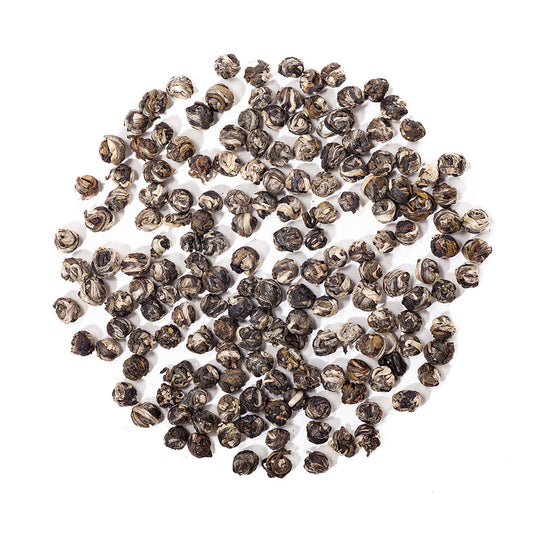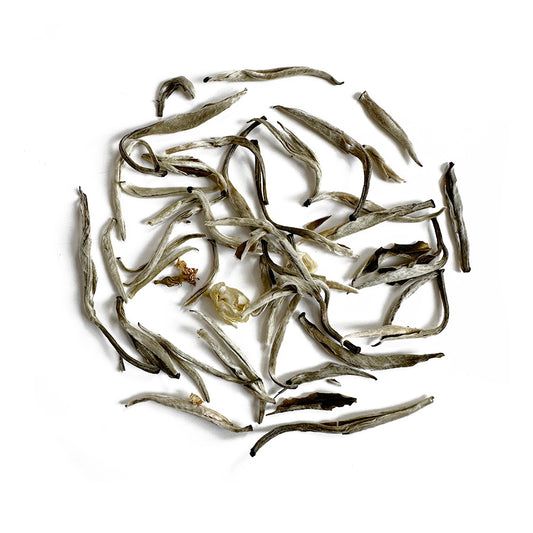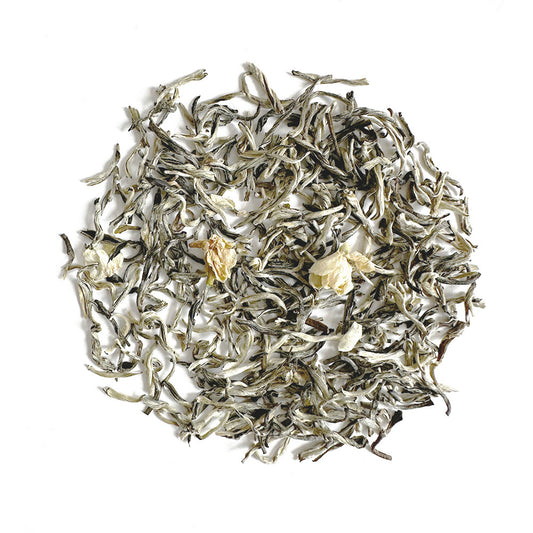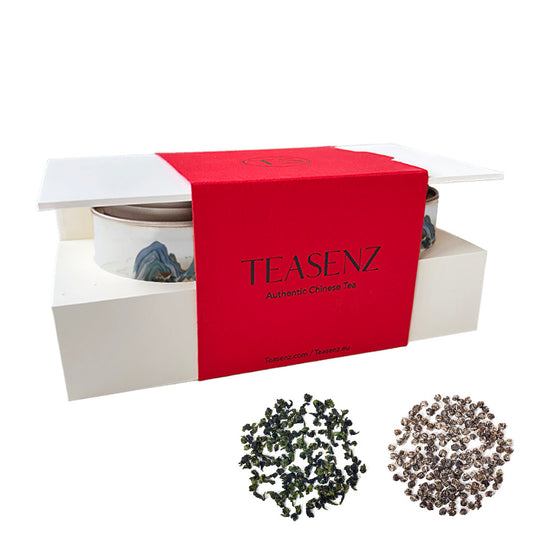Collection: Jasmine Tea
-
'Jasmine Silver Needle' White Tea
Regular price From €3,95 EURRegular priceUnit price / per -
'Snow Jasmine' Green Tea Buds
Regular price From €3,50 EURRegular priceUnit price / per -
 Sold out
Sold outJasmine Dragon Pearls
Regular price From €2,95 EURRegular priceUnit price / per -
 Sold out
Sold outJasmine Tea Deluxe with Flowers
Regular price From €2,50 EURRegular priceUnit price / per -
Teasenz Light Oolong & Jasmine Tea Gift Box
Regular price €35,90 EURRegular priceUnit price / per
Do you have questions about Jasmine Tea?
Jasmine Tea 101
What is Jasmine Tea
Jasmine tea encompasses various types of tea that are scented with the delicate aroma of jasmine flowers. While jasmine tea may be made from different varieties, white and green teas are most commonly associated with this process. That said, it's also possible to scent other tea types, such as black or oolong tea, with the jasmine flowers. We're often asked questions like 'is jasmine tea a green tea'? Or 'Is jasmine tea the same as black tea'? Well that depends. In theory, any tea can be scented with these delicate flowers.
There are 2 methods used to fragrance tea with jasmine: the artificial and natural method. The latter, which involves using whole, fresh jasmine flowers, yields a more authentic and pleasing taste compared to adding artificial scents.
At Teasenz, we take great care in naturally scenting our jasmine teas. This process is meticulous but highly rewarding. Our tea leaves are harvested during early spring and carefully stored to preserve its freshness. As the summer arrives and the jasmine flowers bloom, the flowers are handpicked early in the day. Once night falls and the flowers fully open, they are layered with the tea leaves to impart their intense and delightful scent, which are absorbed by the leaves. This process is repeated every night for up to 7 consecutive nights. The result is a labor of love that truly pays off in the final product.
What are the benefits of Jasmine Tea
Jasmine tea offers numerous benefits, including promoting calmness, enhancing mental clarity, and boosting the immune system. The fragrance of jasmine blossoms combined with the camellia sinensis tea base contributes to its advantages. Additionally, white tea, green tea, and black tea each possess their own unique set of benefits.
Calming and Relaxing: Scientific studies have shown that jasmine-scented tea has a soothing and sedative effect, aiding in relaxation. Green, white, and black teas also contain l-theanine, a compound known to reduce anxiety and stress. This makes jasmine tea an ideal choice for those looking to unwind after a long day.
Improved Mental Clarity and Alertness: Research suggests that jasmine tea can increase alertness and attention. Moreover, moderate amounts of caffeine found in black, white, and green teas can enhance energy levels and improve cognitive function.
Enhanced Immune System: Green tea is renowned for its immune-boosting properties, thanks to the presence of catechins. These compounds help protect against illnesses such as the flu and common cold.
Reduced Inflammation: Black, green, and white teas have been found to possess anti-inflammatory properties. Drinking jasmine tea can provide temporary relief from aches, pains, and chronic inflammatory conditions like arthritis.
Aid in Digestion: Jasmine tea can assist in digestion and soothe stomach discomfort after a meal.
Skincare Benefits: The antioxidants in jasmine tea can help protect the skin from free radical damage, reducing signs of aging and promoting a healthy glow.Weight Management: Jasmine tea is calorie-free and contains caffeine, making it an ideal drink for weight management. The caffeine content boosts metabolism and can aid in burning fat. Additionally, the soothing effects of jasmine tea can also reduce stress-induced cravings for unhealthy foods. Rich in Antioxidants: All teas derived from the camellia sinensis plant are abundant in antioxidants. These compounds combat harmful free radicals, and promote cellular health.
Jasmine Tea & caffeine
The caffeine content of jasmine tea is often a matter of concern for tea enthusiasts. Determining the precise amount of caffeine in jasmine tea can be challenging due to various factors, including the type of tea, characteristics of the leaves, steeping utensils, leaf-to-water ratio, and steeping parameters. If you're concerned about caffeine intake, it's advisable to avoid drinking jasmine tea in the late afternoon and evening. You may also consider using fewer tea leaves and steeping them at lower temperatures to reduce the caffeine content in your cup of tea.
Where to buy Jasmine Tea
Look no further than Teasenz.eu or Teasenz.com for high quality loose leaf jasmine tea. Our teas are sourced directly from the tea gardens to ensure affordability, and are carefully selected based on our quality standards.
However, we don't offer jasmine tea bags. For those, you may visit your local grocery stores or Asian supermarkets.
Other FAQ about Jasmine Tea
Where did jasmine tea originate from?
Jasmine tea has been enjoyed for centuries and its origin can be traced back to China, where it was first created during the Song Dynasty. Over time, jasmine tea gained popularity and spread to other parts of Asia before becoming a beloved beverage around the world.
How to make jasmine tea?
For detailed instructions on how to steep our individual jasmine tea varieties, we highly recommend visiting the respective pages above dedicated to each tea.
Does jasmine tea help to fall asleep?
Although the aroma of jasmine tea is known for its calming properties and potential to induce sleep, the presence of caffeine in jasmine can counteract these effects. Consequently, unless one opts for a decaffeinated version of jasmine tea, it may not effectively aid in falling asleep.
Is jasmine tea suitable during pregnancy?
As jasmine tea contains caffeine, we generally recommend to either avoid it or consume in moderation.
Can jasmine tea cause diarrhea?
Excessive consumption of jasmine tea, especially on an empty stomach, may lead to diarrhea due to its caffeine content.





